In our last edition of In Conversion, some of our new organic entrants were in the process of saying goodbye to chemical nitrogen, while others had never used it and were busy planning for the summer months.
How are our entrants faring with winter on the horizon?
Una Wycherly and Dan Hogan
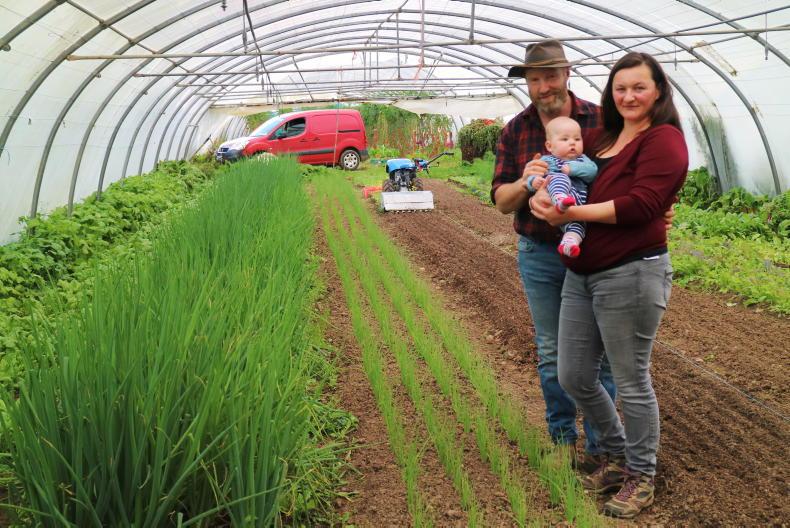
Una and Dan will harvest and sell their vegetables throughout much of the winter.
Location: Larkin’s Hill Farm, Co Tipperary.What they produce: Fresh vegetables, some tillage (barley; straw) and beef.Acreage: 125ac (10ac in barley; 10ac in vegetables and the remainder for grazing cattle).How was the summer?
Una and Dan have been busy with their four-month-old baby and are in the process of building a new home, but these things didn’t affect their busy summer on the farm. When I visited in late September, they had just topped their potatoes and were beginning to harvest their main crop. I could also see cauliflower, Romanesco, broccoli, cabbages, kale and leeks out in the field.
In one of their four commercial polytunnels was a sea of red and green – vertically grown tomatoes. In another polytunnel are rows of green onion, rainbow chard, salad greens and other neatly tended beds. These vegetables will continue to be harvested and sold throughout the winter months alongside their root crops.
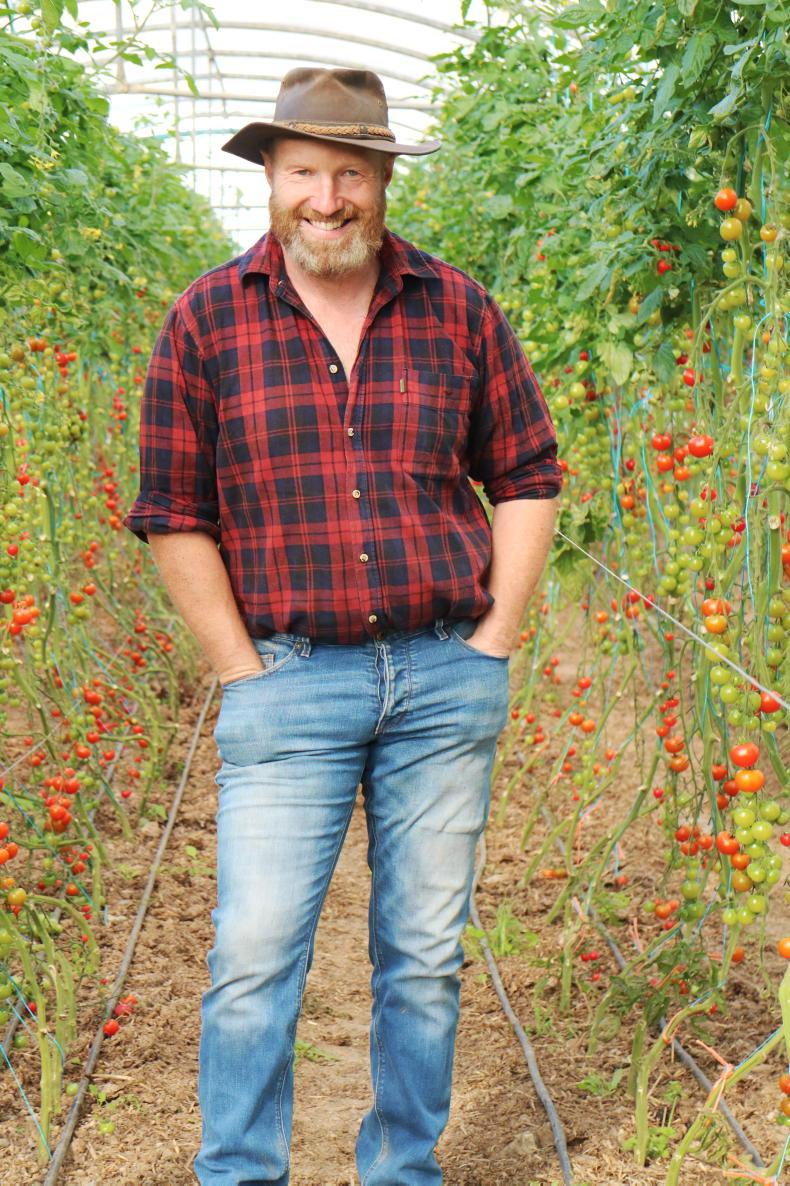
Dan Hogan says their work with Harvest Day vegetables boxes has been very successful this past year.
“The Harvest Day vegetable box scheme has probably been our biggest sales area over the past year,” Dan says. “Obviously during the pandemic and lockdowns people were at home cooking their own meals and the demand for the vegetable boxes was very high. Then, when things started opening up in August it got a little quieter as people started going on their holidays again – but these ups and downs are all part of it.”
They continue to sell their vegetables through the Urban Co-op in Limerick and in local SuperValus alongside the Harvest Day vegetable boxes.
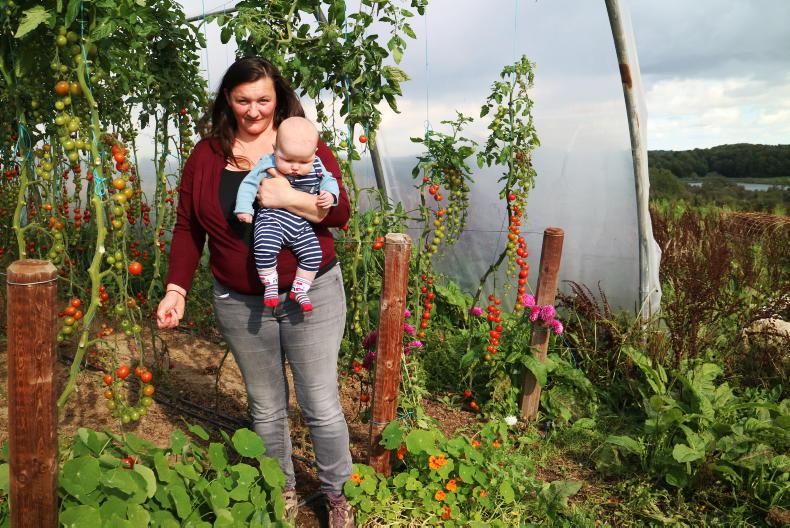
Una Wycherly with her four-month-old son near one of their polytunnels.
We visited a newly reseeded field, which was sown with Italian rye and red clover. It was recently cut but the new growth since was impressive – they plan to get another cut before the winter. Between their silage and the straw they harvested this summer, they believe they will have enough fodder and bedding to get their Limousin X Simmental herd through the winter months.
“It’s funny,” Una remarks. “People often see organic farming as something completely alternative when, in reality, lots of farmers are converting and organic is becoming far more mainstream.”
At the time of my visit, the couple had still not heard whether they had been accepted into the Government’s Organic Farming Scheme, which had opened the previous April and provides financial support to farmers to encourage production of organic foods. A few days after my visit, Una happily informed me that they had received confirmation of their acceptance.
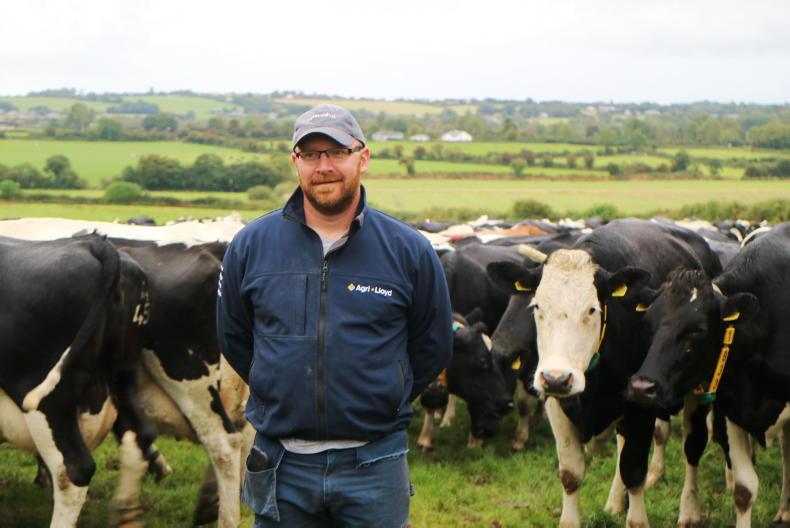
Kevin works closely with the farm owner to improve the genetics of the Holstein/Norweigan Red/Fleckvieh herd.
Location: Co CarlowWhat they produce: Kevin manages a dairy farm in nearby Co Wexford and keeps cereal, sheep, pigs and chickens at his home farm – both are in conversion.Acreage: 300ac work farm and 25ac home farm.How was the summer?
When we last spoke, Kevin O’Hanlon was busy on the dairy farm he manages. For the last few years, he has worked closely with the farm owner to plan their eventual conversion to organics and increased self-sufficiency.
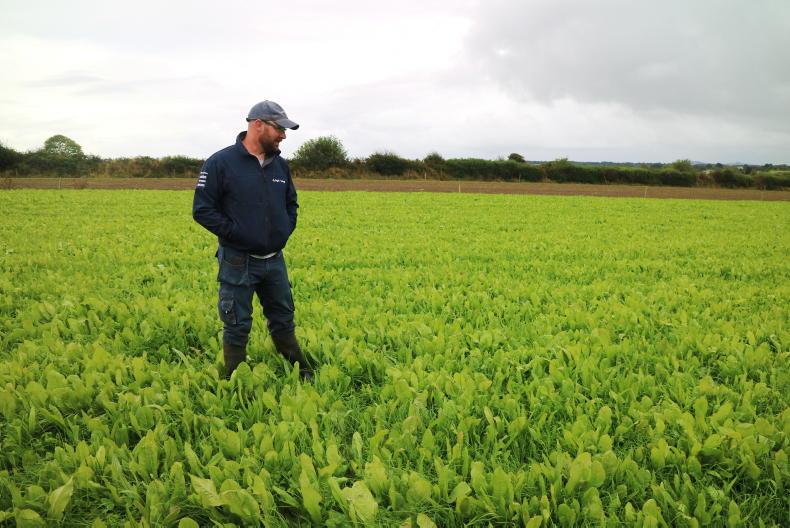
There has been great success with the multispecies swards on the dairy farm Kevin manages.
They did this by making small changes over time: gradually lowering their nitrogen use, working with the genetics and breeding of their herd and experimenting with cover crops and herbal lays. Wind turbines and solar panels have been installed on the farm, as well, and the electricity generated is used on the farm.
Kevin also recently received confirmation that both his home farm and the dairy farm he manages have been accepted onto the Government’s Organic Scheme. With over 300ac on the dairy farm with which to work, they are milking around 170 Holstein/Norweigan Red/Fleckvieh crosses and calving year round.
With winter approaching, he feels satisfied with the amount of silage, meal from protein cover crops and straw he has built up throughout the spring and summer months. He plans to keep the cows at grass for as long as possible but says this summer was touch and go at times as the weather was changeable.
“This area can dry out really quickly when you have hot weather, so we didn’t do as many cuts of silage this year [as in other areas],” he explains.
That said, he was very pleased with the overall growth on the dairy farm; particularly with their newly seeded multispecies fields (seed sourced from global seed company DLF), which feature a mixture of Lucerne (a type of pea), clover, chicory and plantain.
“I spread around 17kg of seed per acre,” he says. “Though that can get expensive; I’m not sure I’d go that heavy in the future.”
Kevin believes they should get three to four years before needing to oversow the chicory and plantain. Overall, they are happy with the performance of the cows. He says the expected yield loss (which naturally happens with organic farming) has only been a few hundred litres per head and he predicts they will end up at around 7,800l/head this year with 600kg of solids. This is based on feeding a mixture of grass and GMO-free (genetically modified-free) feed (they do not have to give certified organic feed at this time in their conversion).
“We feed around 1.2t of meal per head,” he says, “and we hope to pull this back to around 900kg when converted – by then, it will be, hopefully, mostly home grown.”
They will buy in meal for the winter months, as well as extra straw for bedding, as needed, but Kevin says overall input costs have decreased.
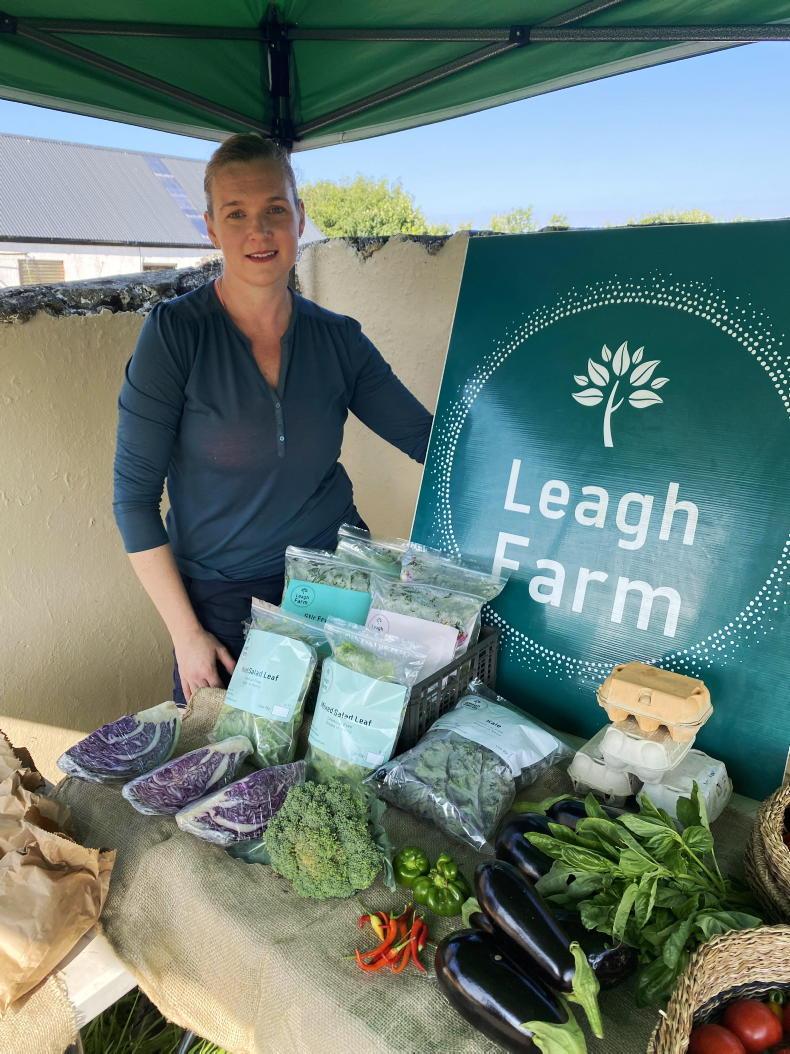
Billy Jo delivers her vegetables throughout north Kerry and also operates a farm gate stall.
Location: Leagh Farm, Co Kerry.What they produce: Vegetables.Acreage: ¼ac with plans to expand.How was the summer?
With a background in hospitality (growing up her parents ran a local restaurant) and retail, Billy Jo O’Connor’s experience was not in farming. She lived in the Middle East for several years and saw how popular organic foods were there and saw potential when she, her husband and their children moved back to her husband’s home place in north Kerry.
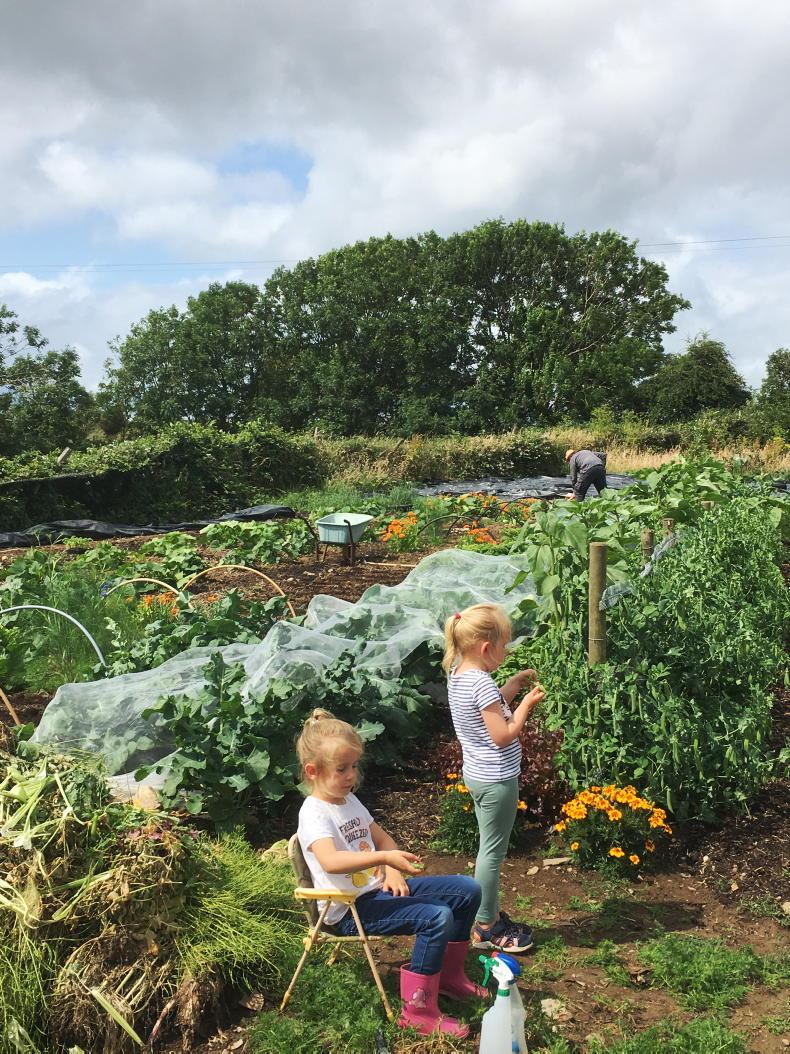
Billy Jo's children enjoy helping their mother in the garden during the summer holidays.
“We were in the Middle East for eight years,” she says. “My eldest was born there, then we came home and my second and third child were born in Ireland. The year after our youngest daughter was born, we started selling vegetable boxes.”
From the start of business, being organic was important to Billy Jo. To achieve this, starting off small – on just a quarter acre – has worked well for her as she navigates the ups and downs of growing food. They sell their vegetable boxes throughout North Kerry and also operate a farm gate stall. They deliver from her base in Ballyduff all the way down to Tralee.
“So we started small; seeing what we could grow and what we might come up against,” she explains. “Each year, we grew a bit more until we built a polytunnel and had enough produce to supply a few other homes. Thankfully, there was a market for it. We had a waiting list the first year [for veg boxes] and had to turn people down but we’ve expanded each year just a bit more.”
This year, Billy Jo finally felt ready to apply for organic certification. “There’s a lot of paperwork involved in organic conversion,” she says. “When I wanted to start the process, the pandemic hit and it all was too much. At the start of this season (in March) we put our paperwork in and this is our first year in ‘proper’ conversion, even though we’ve always grown organically.”
Her farm may be small, but it is mighty (popular) with the locals. They still have a waiting list as they can’t produce enough vegetables for everyone who would like them, but they also have a very loose policy in terms of opting out. If someone can’t keep their boxes going, they can simply cancel and the next person on the list can start receiving their boxes.
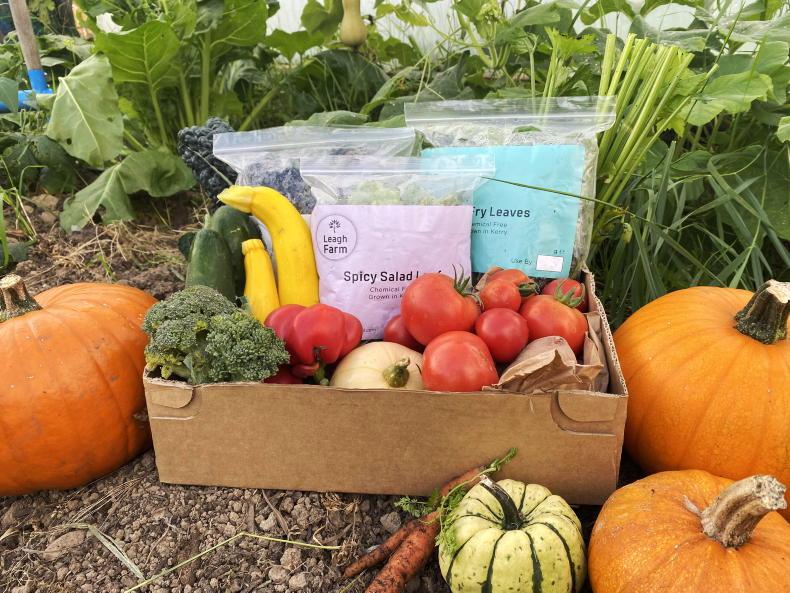
One of Billy Jo's Leagh Farm vegetable boxes.
“We’re making good progress financially,” Billy Jo says. “It’s not just an expensive hobby, and I never wanted it to be that way. I’m doing a Local Enterprise ‘Start Your Own Business’ course now, too. The organic conversion helps you by keeping tight records on what you sell and harvest. You can put a financial tag to those records and see where your money is being spent to make yourself more profitable. After all, it is a business at the end of the day.”
leaghfarm.ie
*All of our organic entrants are being certified through the Irish Organic Association
Read more
In conversion: new organic entrants diary
Is converting to organic systems worthwhile?
In our last edition of In Conversion, some of our new organic entrants were in the process of saying goodbye to chemical nitrogen, while others had never used it and were busy planning for the summer months.
How are our entrants faring with winter on the horizon?
Una Wycherly and Dan Hogan

Una and Dan will harvest and sell their vegetables throughout much of the winter.
Location: Larkin’s Hill Farm, Co Tipperary.What they produce: Fresh vegetables, some tillage (barley; straw) and beef.Acreage: 125ac (10ac in barley; 10ac in vegetables and the remainder for grazing cattle).How was the summer?
Una and Dan have been busy with their four-month-old baby and are in the process of building a new home, but these things didn’t affect their busy summer on the farm. When I visited in late September, they had just topped their potatoes and were beginning to harvest their main crop. I could also see cauliflower, Romanesco, broccoli, cabbages, kale and leeks out in the field.
In one of their four commercial polytunnels was a sea of red and green – vertically grown tomatoes. In another polytunnel are rows of green onion, rainbow chard, salad greens and other neatly tended beds. These vegetables will continue to be harvested and sold throughout the winter months alongside their root crops.

Dan Hogan says their work with Harvest Day vegetables boxes has been very successful this past year.
“The Harvest Day vegetable box scheme has probably been our biggest sales area over the past year,” Dan says. “Obviously during the pandemic and lockdowns people were at home cooking their own meals and the demand for the vegetable boxes was very high. Then, when things started opening up in August it got a little quieter as people started going on their holidays again – but these ups and downs are all part of it.”
They continue to sell their vegetables through the Urban Co-op in Limerick and in local SuperValus alongside the Harvest Day vegetable boxes.

Una Wycherly with her four-month-old son near one of their polytunnels.
We visited a newly reseeded field, which was sown with Italian rye and red clover. It was recently cut but the new growth since was impressive – they plan to get another cut before the winter. Between their silage and the straw they harvested this summer, they believe they will have enough fodder and bedding to get their Limousin X Simmental herd through the winter months.
“It’s funny,” Una remarks. “People often see organic farming as something completely alternative when, in reality, lots of farmers are converting and organic is becoming far more mainstream.”
At the time of my visit, the couple had still not heard whether they had been accepted into the Government’s Organic Farming Scheme, which had opened the previous April and provides financial support to farmers to encourage production of organic foods. A few days after my visit, Una happily informed me that they had received confirmation of their acceptance.

Kevin works closely with the farm owner to improve the genetics of the Holstein/Norweigan Red/Fleckvieh herd.
Location: Co CarlowWhat they produce: Kevin manages a dairy farm in nearby Co Wexford and keeps cereal, sheep, pigs and chickens at his home farm – both are in conversion.Acreage: 300ac work farm and 25ac home farm.How was the summer?
When we last spoke, Kevin O’Hanlon was busy on the dairy farm he manages. For the last few years, he has worked closely with the farm owner to plan their eventual conversion to organics and increased self-sufficiency.

There has been great success with the multispecies swards on the dairy farm Kevin manages.
They did this by making small changes over time: gradually lowering their nitrogen use, working with the genetics and breeding of their herd and experimenting with cover crops and herbal lays. Wind turbines and solar panels have been installed on the farm, as well, and the electricity generated is used on the farm.
Kevin also recently received confirmation that both his home farm and the dairy farm he manages have been accepted onto the Government’s Organic Scheme. With over 300ac on the dairy farm with which to work, they are milking around 170 Holstein/Norweigan Red/Fleckvieh crosses and calving year round.
With winter approaching, he feels satisfied with the amount of silage, meal from protein cover crops and straw he has built up throughout the spring and summer months. He plans to keep the cows at grass for as long as possible but says this summer was touch and go at times as the weather was changeable.
“This area can dry out really quickly when you have hot weather, so we didn’t do as many cuts of silage this year [as in other areas],” he explains.
That said, he was very pleased with the overall growth on the dairy farm; particularly with their newly seeded multispecies fields (seed sourced from global seed company DLF), which feature a mixture of Lucerne (a type of pea), clover, chicory and plantain.
“I spread around 17kg of seed per acre,” he says. “Though that can get expensive; I’m not sure I’d go that heavy in the future.”
Kevin believes they should get three to four years before needing to oversow the chicory and plantain. Overall, they are happy with the performance of the cows. He says the expected yield loss (which naturally happens with organic farming) has only been a few hundred litres per head and he predicts they will end up at around 7,800l/head this year with 600kg of solids. This is based on feeding a mixture of grass and GMO-free (genetically modified-free) feed (they do not have to give certified organic feed at this time in their conversion).
“We feed around 1.2t of meal per head,” he says, “and we hope to pull this back to around 900kg when converted – by then, it will be, hopefully, mostly home grown.”
They will buy in meal for the winter months, as well as extra straw for bedding, as needed, but Kevin says overall input costs have decreased.

Billy Jo delivers her vegetables throughout north Kerry and also operates a farm gate stall.
Location: Leagh Farm, Co Kerry.What they produce: Vegetables.Acreage: ¼ac with plans to expand.How was the summer?
With a background in hospitality (growing up her parents ran a local restaurant) and retail, Billy Jo O’Connor’s experience was not in farming. She lived in the Middle East for several years and saw how popular organic foods were there and saw potential when she, her husband and their children moved back to her husband’s home place in north Kerry.

Billy Jo's children enjoy helping their mother in the garden during the summer holidays.
“We were in the Middle East for eight years,” she says. “My eldest was born there, then we came home and my second and third child were born in Ireland. The year after our youngest daughter was born, we started selling vegetable boxes.”
From the start of business, being organic was important to Billy Jo. To achieve this, starting off small – on just a quarter acre – has worked well for her as she navigates the ups and downs of growing food. They sell their vegetable boxes throughout North Kerry and also operate a farm gate stall. They deliver from her base in Ballyduff all the way down to Tralee.
“So we started small; seeing what we could grow and what we might come up against,” she explains. “Each year, we grew a bit more until we built a polytunnel and had enough produce to supply a few other homes. Thankfully, there was a market for it. We had a waiting list the first year [for veg boxes] and had to turn people down but we’ve expanded each year just a bit more.”
This year, Billy Jo finally felt ready to apply for organic certification. “There’s a lot of paperwork involved in organic conversion,” she says. “When I wanted to start the process, the pandemic hit and it all was too much. At the start of this season (in March) we put our paperwork in and this is our first year in ‘proper’ conversion, even though we’ve always grown organically.”
Her farm may be small, but it is mighty (popular) with the locals. They still have a waiting list as they can’t produce enough vegetables for everyone who would like them, but they also have a very loose policy in terms of opting out. If someone can’t keep their boxes going, they can simply cancel and the next person on the list can start receiving their boxes.

One of Billy Jo's Leagh Farm vegetable boxes.
“We’re making good progress financially,” Billy Jo says. “It’s not just an expensive hobby, and I never wanted it to be that way. I’m doing a Local Enterprise ‘Start Your Own Business’ course now, too. The organic conversion helps you by keeping tight records on what you sell and harvest. You can put a financial tag to those records and see where your money is being spent to make yourself more profitable. After all, it is a business at the end of the day.”
leaghfarm.ie
*All of our organic entrants are being certified through the Irish Organic Association
Read more
In conversion: new organic entrants diary
Is converting to organic systems worthwhile?













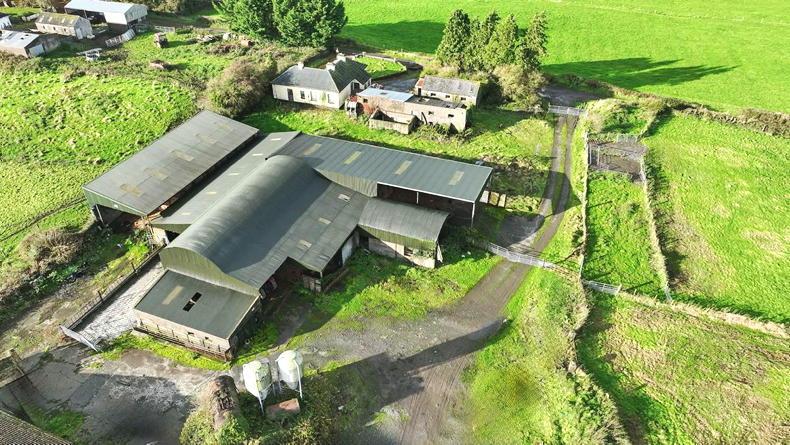
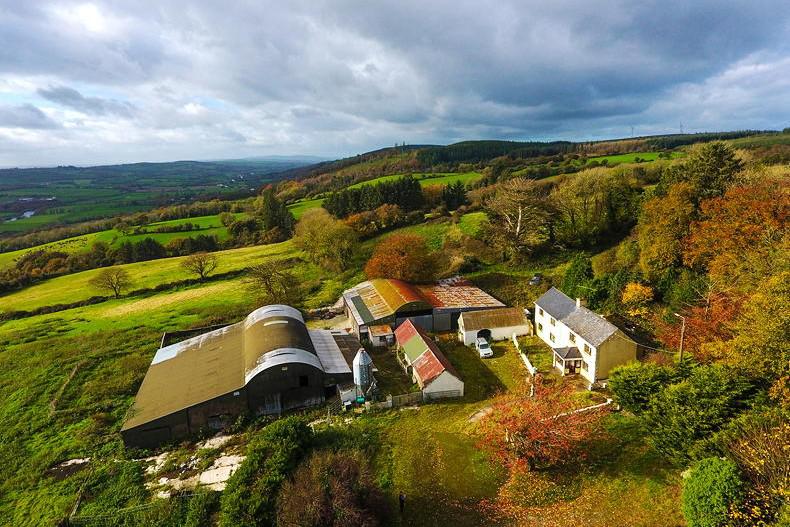
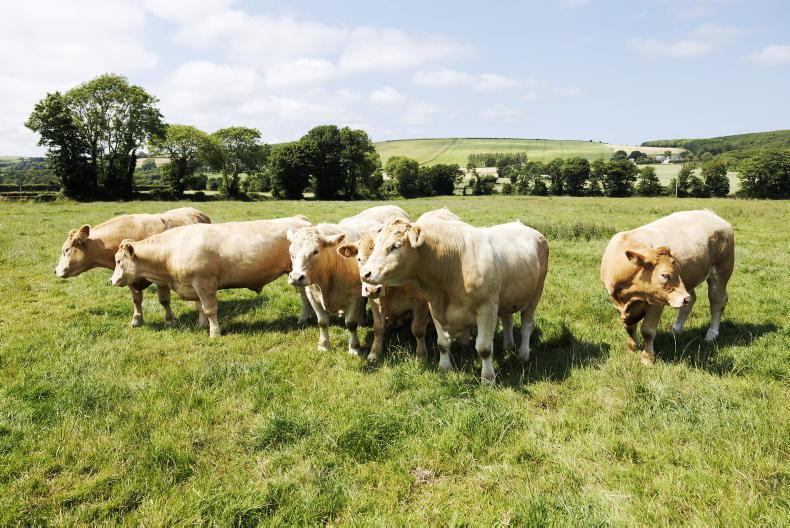

SHARING OPTIONS